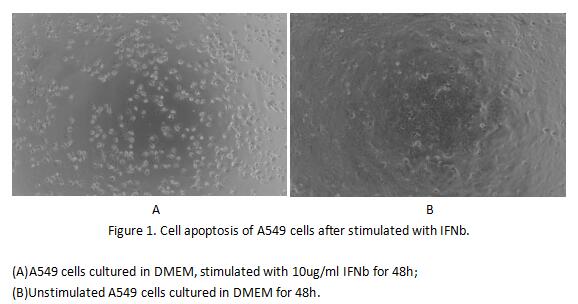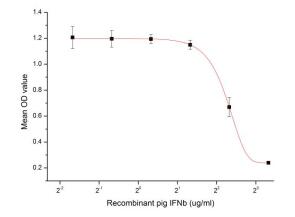Active Interferon Beta (IFNb)
IFNB1; IFN-B; IFB; IFF; IFNB; Interferon Beta 1 Fibroblast
- Product No.APA222Po02
- Organism SpeciesSus scrofa; Porcine (Pig) Same name, Different species.
- Buffer FormulationPBS, pH7.4, containing 0.01% SKL, 5% Trehalose.
- TraitsFreeze-dried powder
- Purity> 97%
- Isoelectric Point4.6
- ApplicationsCell culture; Activity Assays.
- Download Instruction Manual
- UOM 10µg50µg 200µg 1mg 5mg
-
FOB
US$ 362
For more details, please contact local distributors!US$ 905
For more details, please contact local distributors! US$ 1810
For more details, please contact local distributors! US$ 5430
For more details, please contact local distributors! US$ 13575
For more details, please contact local distributors!
ACTIVITY TEST of the Active Interferon Beta (IFNb)

Interferon Beta (IFNb) is belongs to type I interferons (IFNs) family which a large subgroup of interferon proteins that help regulate the activity of the immune system.The IFNb proteins are produced in large quantities by fibroblasts. They have antiviral activity that is involved mainly in innate immune response. Two types of IFNb have been described, IFNb1 (IFNB1) and IFNb3 (IFNB3). IFNb1 is used as a treatment for multiple sclerosis as it reduces the relapse rate. To test the effect of IFNb on cell apoptosis, A549 cells were seeded into triplicate wells of 96-well plates at a density of 5,000 cells/well and allowed to attach, replaced with serum-free overnight, then the medium was replaced with 5% serum standard DMEM prior to the addition of various concentrations of recombinant pig IFNb. After incubated for 48h, cells were observed by inverted microscope and cell proliferation was measured by Cell Counting Kit-8 (CCK-8). Briefly, 10 µl of CCK-8 solution was added to each well of the plate, then the absorbance at 450 nm was measured using a microplate reader after incubating the plate for 1-4 hours at 37 ℃. Apoptosis of A549 cells after incubation with IFNb for 48h observed by inverted microscope was shown in Figure1. Cell viability was assessed by CCK-8(Cell Counting Kit-8 ) assay after incubation with recombinant IFNb for 48h. The result was shown in Figure2. It was obvious that IFNb significantly decreased cell viability of A549 cells. The ED50 of recombinant pig IFNb is 4.9 ug/ml.

Figure 2. Cell apoptosis of A549 cells after stimulated with IFNb.
USAGE of the Active Interferon Beta (IFNb)
Reconstitute in 10mM PBS (pH7.4) to a concentration of 0.1-1.0 mg/mL. Do not vortex.
STORAGE of the Active Interferon Beta (IFNb)
Avoid repeated freeze/thaw cycles. Store at 2-8°C for one month. Aliquot and store at -80°C for 12 months.
STABILITY of the Active Interferon Beta (IFNb)
The thermal stability is described by the loss rate. The loss rate was determined by accelerated thermal degradation test, that is, incubate the protein at 37°C for 48h, and no obvious degradation and precipitation were observed. The loss rate is less than 5% within the expiration date under appropriate storage condition.
INCREMENT SERVICES
BCA Protein Quantification Kit
Molecular Mass Marker for Protein
Monoclonal Antibody Customized Service
Polyclonal Antibody Customized Service
Protein Activity Test Experiment Service
Electrophoretic Mobility Shift Assay (EMSA) Experiment Service
Buffer
Lentivirus Packaging Experiment Service
Adenovirus Packaging Experiment Service
Real Time PCR Experimental Service
Spike RBD Protein (S-RBD)
Protein G
Protein A
Related products
| Catalog No. | Organism species: Sus scrofa; Porcine (Pig) | Applications (RESEARCH USE ONLY!) |
| EPA222Po61 | Eukaryotic Interferon Beta (IFNb) | Positive Control; Immunogen; SDS-PAGE; WB. |
| RPA222Po02 | Recombinant Interferon Beta (IFNb) | Positive Control; Immunogen; SDS-PAGE; WB. |
| APA222Po01 | Active Interferon Beta (IFNb) | Cell culture; Activity Assays. |
| APA222Po02 | Active Interferon Beta (IFNb) | Cell culture; Activity Assays. |
| RPA222Po01 | Recombinant Interferon Beta (IFNb) | Positive Control; Immunogen; SDS-PAGE; WB. |
| APA222Po61 | Active Interferon Beta (IFNb) | Cell culture; Activity Assays. |
| PAA222Po01 | Polyclonal Antibody to Interferon Beta (IFNb) | WB; IHC; ICC; IP. |
| LAA222Po81 | FITC-Linked Polyclonal Antibody to Interferon Beta (IFNb) | WB; IHC; ICC; IF. |
| LAA222Po71 | Biotin-Linked Polyclonal Antibody to Interferon Beta (IFNb) | WB; IHC; ICC. |
| MAA222Po21 | Monoclonal Antibody to Interferon Beta (IFNb) | WB; IHC; ICC; IP. |
| SEA222Po | ELISA Kit for Interferon Beta (IFNb) | Enzyme-linked immunosorbent assay for Antigen Detection. |
| LMA222Po | Multiplex Assay Kit for Interferon Beta (IFNb) ,etc. by FLIA (Flow Luminescence Immunoassay) | FLIA Kit for Antigen Detection. |

